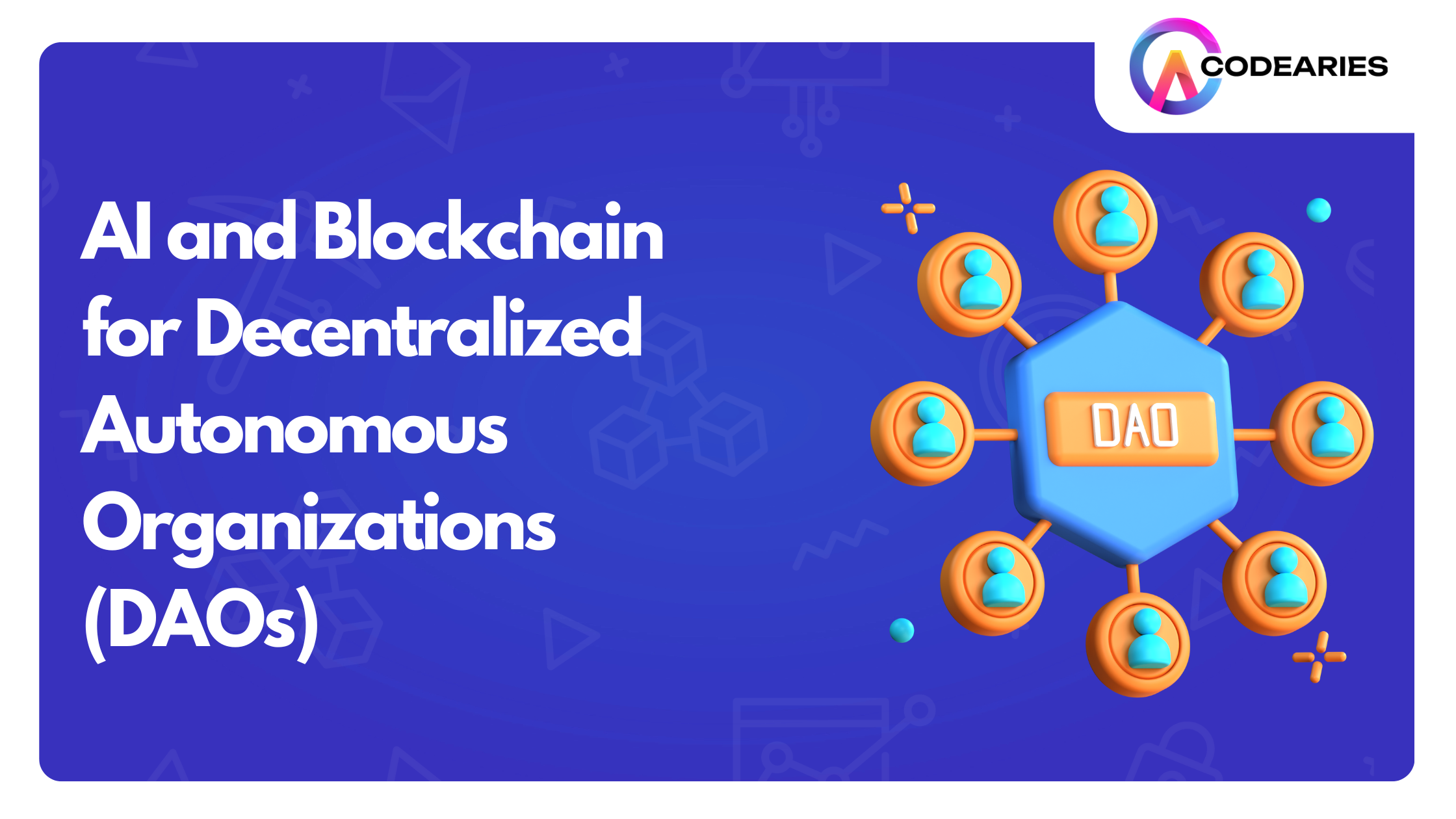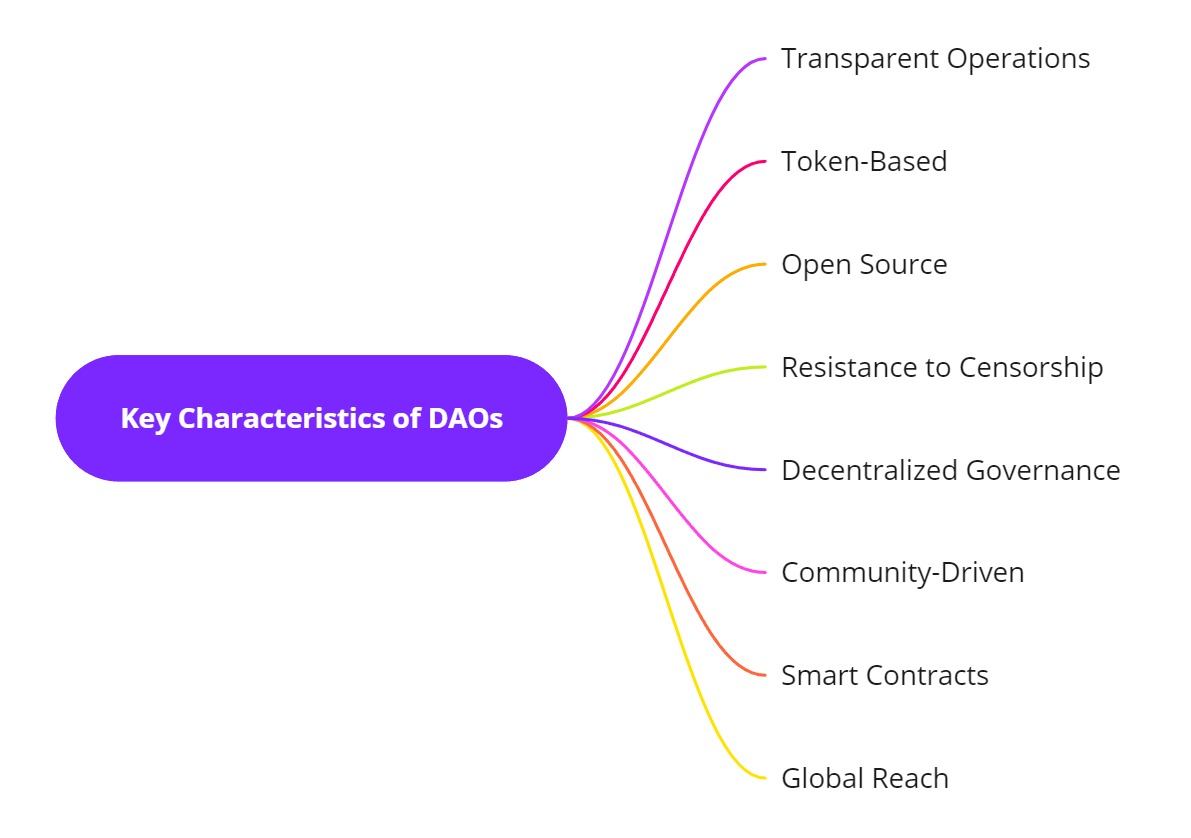
The rise of Artificial Intelligence (AI) and Blockchain is reshaping industries across the globe. One particularly transformative application is in Decentralized Autonomous Organizations (DAOs). Combining AI’s ability to analyze, learn, and automate with blockchain’s immutable and transparent structure creates a powerful synergy that can revolutionize decentralized governance. AI and blockchain allow DAOs to self-govern without human intervention, offering the prospect of more efficient, transparent, and secure operations. This convergence promises to redefine organizational structures and unlock new frontiers in decentralized, trustless ecosystems.
But how exactly does the fusion of these two technologies enhance DAOs? And why is this combination seen as the future of decentralized governance? This comprehensive guide explores the nuances of AI and blockchain within DAOs, highlighting their respective roles and how they work to create a more autonomous and scalable organizational model.
Understanding Decentralized Autonomous Organizations (DAOs)
What Are DAOs?
A Decentralized Autonomous Organization (DAO) is a blockchain-based entity that operates without centralized control. Unlike traditional companies, DAOs are governed by smart contracts and run entirely on code. Members participate in decision-making through a transparent, automated voting system powered by the blockchain. Each decision, whether financial or operational, is governed by the consensus of its participants, ensuring that power is distributed and not concentrated.
Key Characteristics of DAOs
DAOs have several distinguishing characteristics that set them apart from traditional organizations:
- Decentralization: No central authority governs the organization. Instead, governance is distributed among the token holders, enabling collective decision-making.
- Autonomy: Smart contracts enforce rules automatically without human intervention, making the organization self-operate.
- Transparency: Every decision made in a DAO is recorded on the blockchain and visible to all members.
- Community Governance: The organization is guided by the will of its community, which votes on proposals for the DAO’s future direction.
These characteristics make DAOs unique in their operational structure, but combining AI and blockchain takes the potential of these organizations to the next level.
How Blockchain Empowers DAOs
Blockchain empowers Decentralized Autonomous Organizations (DAOs) by providing a robust and secure foundation for decentralized governance and operations. The core of this empowerment lies in smart contracts, which automate decision-making processes, ensure transparency, and reduce the need for intermediaries.
Key Roles of Blockchain in DAOs
- Decentralized Governance: Blockchain’s decentralized ledger allows DAOs to operate without central authority, distributing decision-making power among members. Voting and proposal mechanisms are transparent and immutable, recorded on-chain for everyone to verify.
- Smart Contracts: These self-executing contracts are the backbone of DAOs, enabling predefined rules to govern the organization. Once certain conditions are met, smart contracts execute automatically, streamlining operations like fund distribution, voting, or contract enforcement without human intervention.
- Transparency & Trust: Every action, from voting to fund allocation, is recorded on the blockchain, ensuring complete transparency. Members can audit the activities, creating trust in the system and fostering accountability.
- Tokenization & Incentives: Blockchain allows the issuing of governance tokens that provide voting rights and financial incentives. Token holders participate in decision-making, aligning the community’s interests with the DAO’s success.
- Global Participation: Since DAOs are blockchain-based, they operate across borders, allowing people worldwide to collaborate and contribute without traditional geographic limitations.
The Role of AI in DAOs: A Powerful Partnership
Artificial Intelligence (AI) and Decentralized Autonomous Organizations (DAOs) are transformative technologies that are redefining business and governance. Their integration holds the potential to yield innovative solutions and enhance organizational effectiveness.
Key Roles of AI in DAOs
Enhanced Decision-Making:
-
- Data Analysis: AI excels at processing extensive datasets, enabling the identification of trends, patterns, and risks. This capability allows DAOs to make more strategic, informed decisions.
- Predictive Analytics: By leveraging historical data, AI can forecast future outcomes, helping DAOs to identify challenges and seize opportunities proactively.
- Risk Assessment: AI technologies can assess potential vulnerabilities, allowing DAOs to implement proactive measures to mitigate risks effectively.
Improved Efficiency:
-
-
- Automation: AI can take over repetitive tasks, allowing human resources to concentrate on strategic initiatives that drive value.
- Streamlined Processes: AI optimizes workflows, reduces inefficiencies, and accelerates operations, leading to cost savings and enhanced productivity.
-
Enhanced Governance:
-
-
-
- Fair and Transparent Decision-Making: AI maintains fairness and transparency in decision-making processes, helping to build trust within the organization.
- Community Engagement: AI improves communication and interaction among DAO members, fostering a stronger sense of community and shared ownership.
-
-
Increased Security:
-
- Fraud Detection: AI can help identify and mitigate fraudulent activities, safeguarding the DAO’s assets and maintaining its reputation.
- Cybersecurity: AI technologies enhance the ability to detect and respond to cyber threats, reinforcing the security of the DAO’s infrastructure.
Examples of AI Applications in DAOs:
- Automated Governance: AI can streamline voting, proposal generation, and treasury management processes.
- Smart Contracts: AI can assist in the creation of more sophisticated and adaptable smart contracts.
- AI-Driven Decision-Making Platforms: DAOs can utilize AI-powered platforms to facilitate consensus-building and informed decision-making.
Governance in DAOs: Traditional vs AI-Enhanced
Challenges of Traditional DAO Governance
While DAOs offer decentralization and transparency, traditional governance models often face scalability, efficiency, and human bias challenges. Voting processes can be slow and inefficient, especially in large DAOs where consensus may take time. Moreover, without AI, decision-making is limited by human input, which can introduce delays, errors, or conflicts.
How AI Improves DAO Governance Models
AI-enhanced governance models solve many of the issues associated with traditional DAOs. By introducing machine learning algorithms and automation, DAOs can accelerate decision-making and eliminate human biases. AI can analyze proposals, assess their potential outcomes, and recommend the best action based on real-time data. This makes governance more agile and responsive to changing conditions while ensuring that decisions are data-driven rather than emotionally charged.
Key Use Cases of AI and Blockchain in DAOs
The combination of AI and blockchain technology enhances the efficiency, transparency, and security of Decentralized Autonomous Organizations (DAOs) across several areas:
Governance and Decision-Making
- Automated Voting: AI ensures fair and transparent voting, analyzing patterns to build consensus.
- Predictive Analytics: AI forecasts trends and helps DAOs make informed resource allocation and risk management decisions.
- Bias Detection: AI mitigates bias in decision-making, ensuring inclusivity and fairness.
Community Management
- Personalized Engagement: AI tailors communication and engagement for members, strengthening community bonds.
- Sentiment Analysis: AI analyzes community feedback to assess opinions on proposals and governance.
- Reputation Systems: AI-driven systems reward positive contributions and foster active participation.
Financial Management
- Fraud Detection: AI identifies fraudulent activities, safeguarding DAO funds.
- Risk Assessment: AI evaluates financial risks, helping DAOs make sound investment decisions.
- Portfolio Optimization: AI optimizes investment strategies based on risk tolerance and returns.
Project and Supply Chain Management
- Task Automation: AI streamlines routine tasks, improving operational efficiency.
- Smart Contracts: AI-integrated smart contracts automate processes and enhance supply chain transparency.
- Quality Control: AI monitors product quality, ensuring compliance with standards.
Other Applications
- DeFi: AI enhances the efficiency and security of decentralized financial products.
- Decentralized Social Networks & Gaming: AI personalizes user experiences and drives innovation in decentralized platforms.
AI and blockchain empower DAOs with smarter, more adaptive governance and operations, driving a future of decentralized efficiency.
The Future of AI and Blockchain in DAOs: A Synergistic Partnership
Integrating Artificial Intelligence (AI) and blockchain technology promises to revolutionize the future of Decentralized Autonomous Organizations (DAOs). By combining the strengths of these two transformative technologies, DAOs can evolve into more efficient, transparent, and secure governance systems.
Potential Applications
- AI-Driven Governance Platforms: AI-powered platforms can simplify and enhance key aspects of DAO governance, such as decision-making, voting processes, and consensus-building.
- Smart Contracts with AI Capabilities: Integrating AI into smart contracts can enable more adaptable, dynamic functionalities, allowing contracts to evolve based on changing conditions or input data.
- AI-Powered Community Management: AI can help facilitate community engagement and communication within DAOs, strengthening members’ sense of ownership and belonging.
Conclusion
In conclusion, the fusion of AI and blockchain is revolutionizing Decentralized Autonomous Organizations (DAOs), enhancing their autonomy, efficiency, and transparency. Blockchain ensures secure, decentralized governance, while AI automates decision-making, data analysis, and operations. Together, they create agile, scalable DAOs that minimize human intervention and foster fairness, accountability, and global participation. This powerful combination is shaping the future of decentralized governance, unlocking new possibilities for efficient and trustless ecosystems.
FAQs
What Are the Different Types of DAOs?
- Protocol DAOs: Manage and govern blockchain protocols (e.g., MakerDAO).
- Investment DAOs: Pool funds for collective investments (e.g., The DAO).
- Social DAOs: Focus on community engagement and shared interests (e.g., Friends With Benefits).
- Collective DAOs: Unite individuals for ordinary purposes, like art collection.
- Service DAOs: Offer specific services to clients through decentralized governance.
- Gaming DAOs: Govern gaming assets and communities, influencing game development.
What Is a DAO Tool?
A DAO tool is a software application that facilitates the creation and management of DAOs. It includes features like voting systems and proposal management. Examples include Aragon, DAOstack, and Snapshot.
How Do DAOs Make Money?
DAOs generate revenue through:
- Transaction Fees: Earnings from transactions on protocols.
- Investment Returns: Profits from collective investments.
- Membership Fees: Charges for joining the DAO.
- Token Sales: Issuing tokens to raise capital.
- Service Provision: Charging clients for services offered.
Who Owns a DAO?
Ownership of a DAO is distributed among its members, who hold governance tokens that grant voting power. Decisions are made collectively, ensuring shared ownership and accountability.


